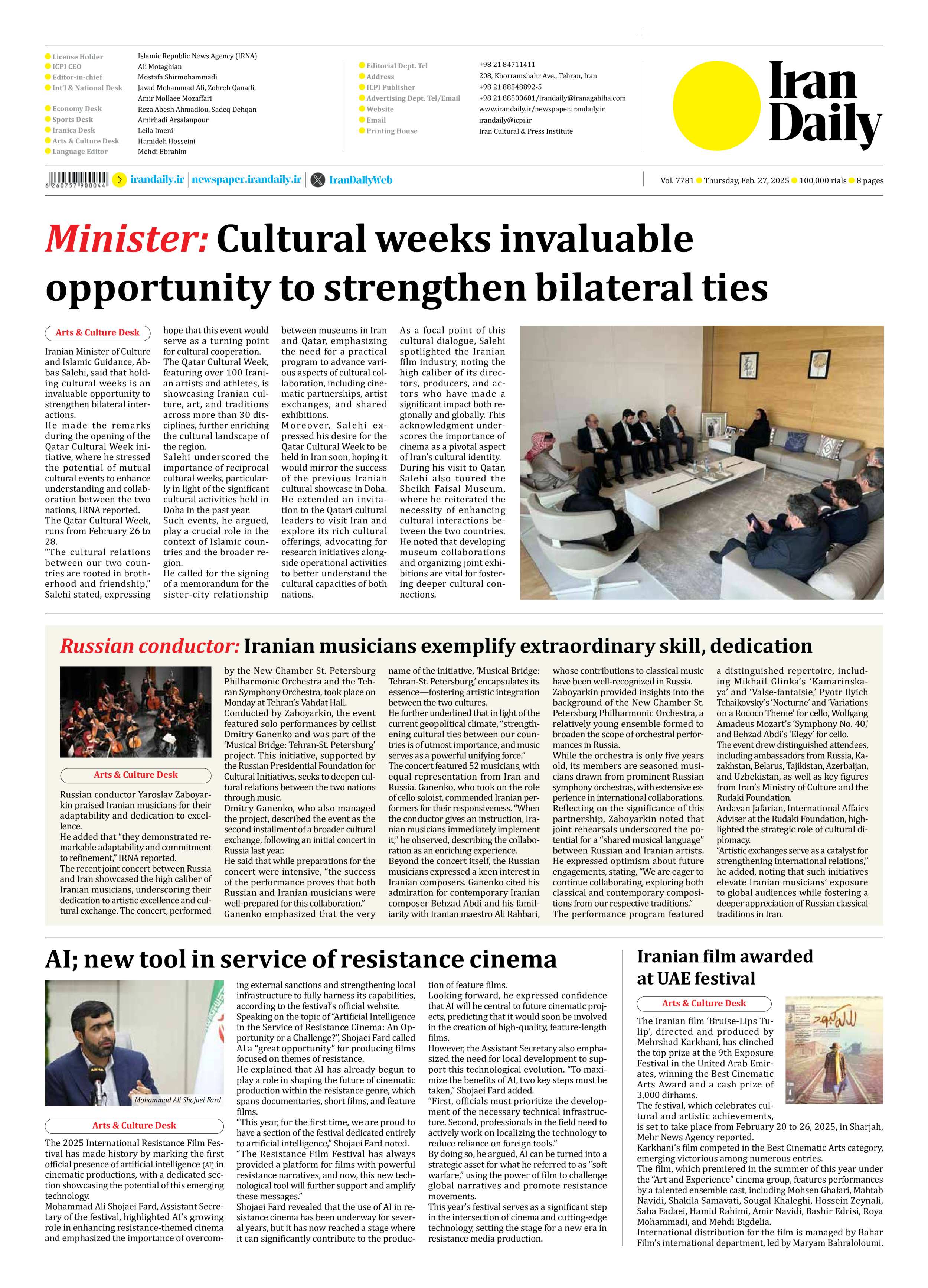
Russian conductor: Iranian musicians exemplify extraordinary skill, dedication
Russian conductor Yaroslav Zaboyarkin praised Iranian musicians for their adaptability and dedication to excellence.
He added that “they demonstrated remarkable adaptability and commitment to refinement,” IRNA reported.
The recent joint concert between Russia and Iran showcased the high caliber of Iranian musicians, underscoring their dedication to artistic excellence and cultural exchange. The concert, performed by the New Chamber St. Petersburg Philharmonic Orchestra and the Tehran Symphony Orchestra, took place on Monday at Tehran’s Vahdat Hall.
Conducted by Zaboyarkin, the event featured solo performances by cellist Dmitry Ganenko and was part of the ‘Musical Bridge: Tehran-St. Petersburg’ project. This initiative, supported by the Russian Presidential Foundation for Cultural Initiatives, seeks to deepen cultural relations between the two nations through music.
Dmitry Ganenko, who also managed the project, described the event as the second installment of a broader cultural exchange, following an initial concert in Russia last year.
He said that while preparations for the concert were intensive, “the success of the performance proves that both Russian and Iranian musicians were well-prepared for this collaboration.”
Ganenko emphasized that the very name of the initiative, ‘Musical Bridge: Tehran-St. Petersburg,’ encapsulates its essence—fostering artistic integration between the two cultures.
He further underlined that in light of the current geopolitical climate, “strengthening cultural ties between our countries is of utmost importance, and music serves as a powerful unifying force.”
The concert featured 52 musicians, with equal representation from Iran and Russia. Ganenko, who took on the role of cello soloist, commended Iranian performers for their responsiveness. “When the conductor gives an instruction, Iranian musicians immediately implement it,” he observed, describing the collaboration as an enriching experience.
Beyond the concert itself, the Russian musicians expressed a keen interest in Iranian composers. Ganenko cited his admiration for contemporary Iranian composer Behzad Abdi and his familiarity with Iranian maestro Ali Rahbari, whose contributions to classical music have been well-recognized in Russia.
Zaboyarkin provided insights into the background of the New Chamber St. Petersburg Philharmonic Orchestra, a relatively young ensemble formed to broaden the scope of orchestral performances in Russia.
While the orchestra is only five years old, its members are seasoned musicians drawn from prominent Russian symphony orchestras, with extensive experience in international collaborations.
Reflecting on the significance of this partnership, Zaboyarkin noted that joint rehearsals underscored the potential for a “shared musical language” between Russian and Iranian artists. He expressed optimism about future engagements, stating, “We are eager to continue collaborating, exploring both classical and contemporary compositions from our respective traditions.”
The performance program featured a distinguished repertoire, including Mikhail Glinka’s ‘Kamarinskaya’ and ‘Valse-fantaisie,’ Pyotr Ilyich Tchaikovsky’s ‘Nocturne’ and ‘Variations on a Rococo Theme’ for cello, Wolfgang Amadeus Mozart’s ‘Symphony No. 40,’ and Behzad Abdi’s ‘Elegy’ for cello.
The event drew distinguished attendees, including ambassadors from Russia, Kazakhstan, Belarus, Tajikistan, Azerbaijan, and Uzbekistan, as well as key figures from Iran’s Ministry of Culture and the Rudaki Foundation.
Ardavan Jafarian, International Affairs Adviser at the Rudaki Foundation, highlighted the strategic role of cultural diplomacy.
“Artistic exchanges serve as a catalyst for strengthening international relations,” he added, noting that such initiatives elevate Iranian musicians’ exposure to global audiences while fostering a deeper appreciation of Russian classical traditions in Iran.







